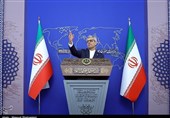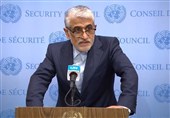Iran’s FM: EU3 Attempts to Invoke Snapback Mechanism Illegal
TEHRAN (Tasnim) – Any potential attempt to activate the so-called snapback mechanism inside the UN Security Council Resolution 2231 that has endorsed a 2015 nuclear deal between Iran and world countries would be illegal, Foreign Minister Abbas Araqchi said.
Tehran has nonetheless prepared a response to any such attempt by the three European parties to the deal, he added.
The comments by Araqchi were made in an interview with IRNA, published on Wednesday, amid growing debates about whether to resume diplomacy, which was derailed after Israel and the United States attacked Iran's nuclear facilities in June.
The Europeans have threatened to trigger the snapback mechanism, embedded in the 2015 nuclear deal, the Joint Comprehensive Plan of Action (JCPOA), to restore all UN sanctions on Iran before the accord officially expires in October.
Araqchi stated that the Europeans have no right to do so, as their recent actions, including discussions of "zero enrichment", have effectively made them non-participants in the JCPOA.
"They think the snapback is the only tool they have," he said.
"Here we have clearly explained our position: first, you have basically no right to use it as you, too, have effectively withdrawn from the deal following the US withdrawal, and with your recent positions, including the zero enrichment. So you’re no longer a participant in the JCPOA, and the right to snapback belongs only to remaining members."
The diplomat then suggested that the snapback would also spell the end of Europe’s role in diplomacy over Tehran’s nuclear work.
"Even if we assume you have the right, what will happen if you do it? First, Europe's role in diplomacy will be completely over. You've used the tool, and it's done. What remains after that? The end of diplomacy?"
The foreign minister said while Iran is working to prevent such an outcome, it is also prepared for the consequences, emphasizing that the economic impact would be minimal and the primary effect would be psychological.
He acknowledged that a return to UN Security Council resolutions, including the possible reinstatement of arms embargoes, is a serious matter. However, he said, the economic impact would be negligible compared to the current unilateral US sanctions.
"The economic sanctions of the Security Council are far more limited than the current unilateral US sanctions," he said.
"Things will not become any worse than the current situation. Yes, from a psychological and political, and even strategic point of view, there are consequences, but not to the extent that it would bring diplomacy to a dead end or paralyze the country.”
According to the official, Iran, in collaboration with China and Russia, has been working for years on a plan to counter the snapback.
"We have had various joint meetings and designed a series of joint measures that we will implement if the snapback is activated," the official said.
Meanwhile, a separate set of negotiations is underway with the International Atomic Energy Agency (IAEA) following the recent US-Israeli attacks on Iranian nuclear facilities.
Araqchi said Iran has begun discussions with the IAEA on a new framework for cooperation.
He said the new cooperation would not be a continuation of the old, as the recent bombing has created an unprecedented situation with new safety and security considerations.
“This new cooperation with the Agency will definitely not be similar to the past, especially because according to the law of the parliament, all matters must be pursued through the Supreme National Security Council, which decides where and how inspections will or will not be carried out.”
He said a complete cessation of collaboration is not an option, citing the need for inspectors to be present for routine activities such as fuel rod replacement at the Bushehr nuclear power plant.
The official also addressed the possibility of direct talks with the United States following its anti-Iran aggression.
"In my view, America has not reached a point where it can enter into an equal negotiation," the official stated, adding that the United States seems to want to "take at the negotiating table what they couldn't get on the battlefield."
“Negotiation with America must be done at its own time," he stated.
"Every negotiation has a specific time that is called ‘negotiation maturity’, and it must reach that maturity to be done. In my opinion, we have not yet reached that point of maturity for an effective negotiation with America to take place.”
Araqchi clarified that while compensation for damages caused by the US aggression against Iranian nuclear facilities would be a topic of negotiation, it would not be a precondition for talks.
"We are receiving contradictory messages through intermediaries," the official said, according to Press TV.
"There is no coherent message from the Americans. I think maybe they still haven't reached a final conclusion."






